CHANS-Net Newsletter -- June 2012
June 18, 2012
Table of Contents
- CHANS-Net events at 2012 AGU Fall Meeting
- 2012 CHANS Fellows aim to expand networks and knowledge
- Remembering Elinor Ostrom
- Global Land Project update
- Photo from the field
- Special issue of Ecological Modelling on CHANS research
- Upcoming events
CHANS-Net events at 2012 AGU Fall Meeting: Submit your abstracts now
CHANS-Net is organizing a series of events at the Fall Meeting of the American Geophysical Union (AGU) in San Francisco Dec. 3-7. The events will draw investigators funded by the National Science Foundation’s program in Coupled Natural and Human Systems (CNH), but other scholars are also welcome to participate.
In addition to presentations and a workshop within the AGU meeting, there will be other opportunities for interactions, which are expected to result in multi-author publications.
CHANS-Net has organized three sessions:
- B056: Resilience and Adaptation of Coupled Human and Natural Systems to Global Change
- H078: Socio-hydrology: Discovering Patterns in Coupled Human-Water Resource Systems
- H079: Water Resources Management and Policy in a Changing World
CHANS-Net also is identifying other sessions relevant to CHANS scientists to give everyone a chance to participate.
So far, you can:
Let us know if you’re considering attending AGU.
Submit abstracts now for one of the three CHANS-Net sessions. Submissions must be made through the AGU Abstract Submission link. Note: You must be an AGU member to submit an abstract; the abstract submission fee is $60.
Gear up for events now in the works: CHANS-Net is planning to showcase CHANS work to the AGU community to give voice to the breadth, creativity and productivity of CHANS researchers. We also are planning a workshop to undertake a joint writing project to publish results presented at the meeting. We will share details as they evolve.
In the meantime, please reserve Dec. 2-7 on your calendar. (We suggest the extra day to allow for the workshop possibility)
Participation in the CHANS events is open to interested individuals. For researchers who have received NSF CNH awards, attending the AGU meeting will fulfill an NSF requirement of CNH awards for participation of at least one senior member of each funded team in a periodic meeting of awardees.
The most current information about CHANS-Net AGU events will be posted on the CHANS-Net AGU page.
2012 CHANS Fellows aim to expand networks and knowledge at AGU Fall Meeting
Ten exceptional junior scholars studying coupled human and natural systems will have a unique opportunity to interact and network with scientific thought leaders at the 2012 American Geophysical Union Fall Meeting in December as part of the CHANS Fellows program.
"Some junior scholars who are interested in research on the interconnectedness between natural and human systems may not be able to attend conferences and other professional events without financial assistance," said Jianguo "Jack" Liu, principal investigator of CHANS-Net. “The Fellows Program was created by CHANS-Net with support from the National Science Foundation to help these promising scientists connect with other researchers at a prominent national event.
“This is the first year we’ve held CHANS-Net events at the AGU Fall Meeting and we’re looking forward to the new opportunities and interactions this event offers," Liu continued. Liu is a professor at Michigan State University.
"Providing these networking opportunities will help the fellows become the next leaders in coupled human and natural systems research, education and application," said William McConnell, co-principal investigator.
The 2012 CHANS Fellows are:
- Giuseppe Feola
- Paige Fischer
- Cerian Gibbes
- Meha Jain
- Amy Lerner
- Marcia Macedo
- Michael Marshall
- Marvin Montefrio
- Kimberly Nicholas
- Kara Stevens
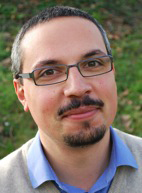 Giuseppe Feola, environment and development lecturer and Walker Institute for Climate System Research associate, University of Reading in England. An environmental scientist, Feola is interested in how coupled human and environment systems dynamically interact through human actions, and how these interactions can be steered toward sustainable pathways. His research has three main themes: models of human actors in CHANS, theories of social-ecological change and integrated sustainability assessment. In a project on smallholder farmers in the Colombian Andes, Feola developed dynamic pesticide-use models to help underpin public policy to minimize health and environmental risks. His current research examines how the same farmers and their institutions are adapting to climate change, as well as the factors that are hindering or helping local communities become more sustainable.
Giuseppe Feola, environment and development lecturer and Walker Institute for Climate System Research associate, University of Reading in England. An environmental scientist, Feola is interested in how coupled human and environment systems dynamically interact through human actions, and how these interactions can be steered toward sustainable pathways. His research has three main themes: models of human actors in CHANS, theories of social-ecological change and integrated sustainability assessment. In a project on smallholder farmers in the Colombian Andes, Feola developed dynamic pesticide-use models to help underpin public policy to minimize health and environmental risks. His current research examines how the same farmers and their institutions are adapting to climate change, as well as the factors that are hindering or helping local communities become more sustainable.
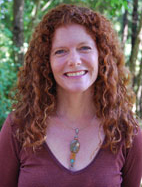 Paige Fischer, research social scientist, U.S. Forest Service Western Wildland Environmental Threat Assessment Center and courtesy professor, Oregon State University. Fischer’s research focuses on how people perceive and respond to ecological risks such as biodiversity loss, wildfire and climate change.
Paige Fischer, research social scientist, U.S. Forest Service Western Wildland Environmental Threat Assessment Center and courtesy professor, Oregon State University. Fischer’s research focuses on how people perceive and respond to ecological risks such as biodiversity loss, wildfire and climate change.
A current project is on the informal social networks people and organizations use to communicate about natural resource problems. Do the structures of these social networks affect how people adapt to environmental risks and changes? For example, are diverse networks more likely to spawn innovative solutions to natural resource problems than homogeneous networks?
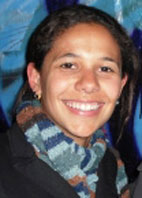 Cerian Gibbes, assistant professor of geography and environmental studies, University of Colorado-Colorado Springs. Gibbes’ research is centered on human-environment interactions in land change science, focusing on Latin America, the Caribbean and Africa and the Southwestern United States.
Cerian Gibbes, assistant professor of geography and environmental studies, University of Colorado-Colorado Springs. Gibbes’ research is centered on human-environment interactions in land change science, focusing on Latin America, the Caribbean and Africa and the Southwestern United States.
Her work incorporates land use and land cover change modeling, remote sensing and spatial statistics to understand relationships between climate, land and people.
 Meha Jain, ecology, evolution and environmental biology doctoral student, Columbia University. Jain’s research focuses on how farmers are adapting to climate change in India, as well as the effects of the farmers’ actions on their livelihoods and groundwater.
Meha Jain, ecology, evolution and environmental biology doctoral student, Columbia University. Jain’s research focuses on how farmers are adapting to climate change in India, as well as the effects of the farmers’ actions on their livelihoods and groundwater.
By combining techniques from geography, ecology, economics and anthropology, she is working to quantify the complex relationships between decision-making, natural resource use and land cover change.
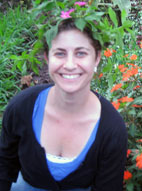 Amy Lerner, post-doctoral geography and human ecology researcher, Rutgers University. Her current research is examining the causes and consequences of silvo-pastoral landscapes – cattle pastures where farmers have let trees grow – in the southern Ecuadorian Amazon.
Amy Lerner, post-doctoral geography and human ecology researcher, Rutgers University. Her current research is examining the causes and consequences of silvo-pastoral landscapes – cattle pastures where farmers have let trees grow – in the southern Ecuadorian Amazon.
“In our project we’re asking, ‘What factors are associated with silvo-pastoral landscapes and what benefits could they have for the carbon budget?” Lerner said. “It’s not clear what is driving silvo-pastoral landscapes but the phenomenon of ranchers leaving trees in their pastures could arise from a combination of demographic, ecological and cultural factors. Our hypothesis is that these landscapes have the potential to generate a carbon sink while at the same time providing an agriculturally-based livelihood for land owners, which is imperative given the pressure that we have on forests for food production.”
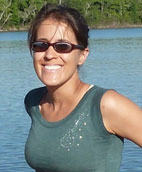 Marcia Macedo, post-doctoral fellow, Woods Hole Research Center; associate researcher, Amazon Environmental Institute. According to Macedo, producing enough food to feed a growing population, while conserving tropical forests and the ecological services they provide, will be one of the great challenges of this generation. As global demand for agriculture products increases, so will the pressure to convert tropical forests to agricultural production. Macedo is interested in understanding the ecological tradeoffs between forest conservation and food production in the Amazon’s agricultural frontier, as well as the consequences of land-use decisions for tropical streams.
Marcia Macedo, post-doctoral fellow, Woods Hole Research Center; associate researcher, Amazon Environmental Institute. According to Macedo, producing enough food to feed a growing population, while conserving tropical forests and the ecological services they provide, will be one of the great challenges of this generation. As global demand for agriculture products increases, so will the pressure to convert tropical forests to agricultural production. Macedo is interested in understanding the ecological tradeoffs between forest conservation and food production in the Amazon’s agricultural frontier, as well as the consequences of land-use decisions for tropical streams.
Macedo’s current research examines how large-scale deforestation alters the cycling of water and energy in Mato Grosso, Brazil. She is particularly interested in identifying management strategies that can help minimize the direct impacts of agricultural production on streams, as well as linking her research to the policies that ultimately determine land management on the ground.
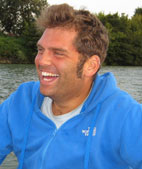 Michael Marshall, Mendenhall Research Fellow, U.S. Geological Survey. Marshall is broadly interested in how land surface and atmospheric processes affect agricultural societies.
Michael Marshall, Mendenhall Research Fellow, U.S. Geological Survey. Marshall is broadly interested in how land surface and atmospheric processes affect agricultural societies.
His current project for the U.S. Geological Survey combines hyper-spatial and spectral remote sensing with ancillary spatial data to estimate and evaluate crop water productivity for important crops in California’s Central Valley.
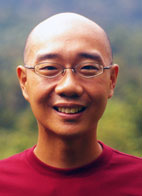 Marvin Montefrio, environment and natural resources doctoral student, State University of New York. His research stems from the interest among governments and private companies to integrate marginalized groups, especially indigenous people, into global commodity markets. Through his research, Montefrio has seen how upland farmers from diverse cultural backgrounds decide whether to engage in partnerships with governments and private firms to grow crops for biofuels and rubber.
Marvin Montefrio, environment and natural resources doctoral student, State University of New York. His research stems from the interest among governments and private companies to integrate marginalized groups, especially indigenous people, into global commodity markets. Through his research, Montefrio has seen how upland farmers from diverse cultural backgrounds decide whether to engage in partnerships with governments and private firms to grow crops for biofuels and rubber.
“I hope that my research will advance theories on the institutional aspects of resource management and decision-making in the context of social-ecological systems,” he said. “I also hope that it will contribute to current policy discussions on biofuels and rubber development.”
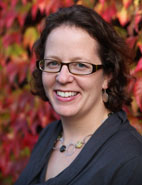 Kimberly Nicholas, assistant professor of sustainability science, Lund University Centre for Sustainability Studies in Sweden. Nicholas’ research aims to understand what human changes to the Earth’s climate and land surface will mean for the future of the globe’s ecosystems, as well as how human needs can be better balanced with sustaining the planet’s life support systems.
Kimberly Nicholas, assistant professor of sustainability science, Lund University Centre for Sustainability Studies in Sweden. Nicholas’ research aims to understand what human changes to the Earth’s climate and land surface will mean for the future of the globe’s ecosystems, as well as how human needs can be better balanced with sustaining the planet’s life support systems.
“I use observational, experimental, modeling and synthesis approaches to study how climate variability and change affect crop development, yields and quality, especially in the wine industry,” she said. “My interest in agriculture is rooted in five generations of my family’s farm in Sonoma, Calif.”
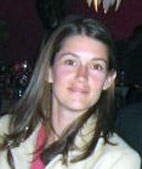 Kara Stevens, fisheries and wildlife doctoral student, Michigan State University. Stevens is studying the social and ecological dynamics of small-scale fisheries on the remote Miskitu Coast of Nicaragua. She’s examining the effects of fishing on a multi-species estuarine fishery, as well as the direct and indirect effects of market access.
Kara Stevens, fisheries and wildlife doctoral student, Michigan State University. Stevens is studying the social and ecological dynamics of small-scale fisheries on the remote Miskitu Coast of Nicaragua. She’s examining the effects of fishing on a multi-species estuarine fishery, as well as the direct and indirect effects of market access.
“I’m identifying how social networks, economic status and catch rates influence a fisherman’s change in harvest and management practices,” she said. “This includes things like using seasonal gear and enforcing sea tenure.
“I’m very interested in addressing challenges at the intersection of biodiversity conservation and economic development, especially during times of significant social and environmental change.”
Remembering Elinor Ostrom
CHANS-Net has lost an inspiring collaborator, mentor and friend with the passing of Elinor Ostrom on June 12.
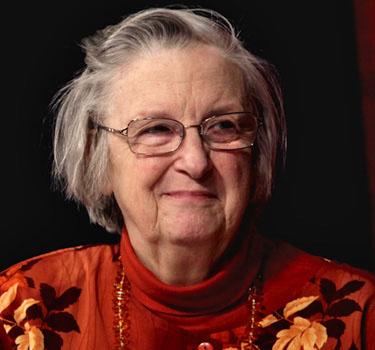 The world knows Lin as its first woman Nobel Laureate in Economic Science. We have had the additional honor of knowing her as a visionary in understanding how crucial the connections are within and across coupled human and natural systems, and how to help scientists around the world expand their research to study CHANS.
The world knows Lin as its first woman Nobel Laureate in Economic Science. We have had the additional honor of knowing her as a visionary in understanding how crucial the connections are within and across coupled human and natural systems, and how to help scientists around the world expand their research to study CHANS.
Lin has been a member of the CHANS-Net advisory board. She will be remembered for her deep commitment to collegial and generous collaboration and her rare combination of intellectual rigor and true kindness.
“She was a pioneer, a scholar who transformed our knowledge in ways that mattered both to science and to the daily lives of millions,” said fellow advisory board member Thomas Dietz of Michigan State University. “She was a delight to know and an inspiration to work with. She will be missed but we will carry on her tradition both theoretically and in the way she conducted herself.”
“Elinor Ostrom has been an enormous example of transdisciplinarity, innovation, and interest in pursuing both basic science and real-world problems,” said Matteo Convertino of the University of Florida. “This is an example that academia, government organizations, and any scientists and policy-makers should take home.”
Lin was the Arthur F. Bentley Professor of Political Science and senior research director of the Workshop in Political Theory and Policy Analysis at Indiana University.
Those wishing to make a memorial donation are referred to the Tocqueville Fund at Indiana University.
Global Land Project update
CHANS-Net jointly organized a workshop on land change meta-analysis at the annual meeting of the Scientific Steering Committee of the Global Land Project (GLP SSC) in Amsterdam May 16-17. The lead organization was the Global Collaboration Engine (GLOBE) project at the University of Maryland, which is supported by NSF’s program on Cyber-enabled Discovery and Innovation (Grant #1125210).
Michigan State University’s Bill McConnell, CHANS-Net Co-PI, provided the GLP SSC an update on CHANS-Net activities, particularly as they relate to the synthesis of knowledge on land change, building on the Co-PI’s work on meta-analysis of agricultural change in the tropics, as well as work led by CHANS-Net PI Jack Liu published in Science (317: 1513-1516, 2007). Other invited experts on land change meta-studies included:
- Ole Mertz, University of Copenhagen, Denmark
- Andreas Heinimann, University of Bern, Switzerland
- Thomas Rudel, Rutgers University, USA
- Dawn Parker, University of Waterloo, Canada
- Henri de Groot and Sanneke van Asselen, VU University, The Netherlands
- Erle Ellis, Wayne Lutters, Nick Magliocca and Alyson Young, University of Maryland Baltimore County
After the meeting, participants wrote the first draft of a manuscript outlining the workshop’s major findings and recommendations.
Photo from the field
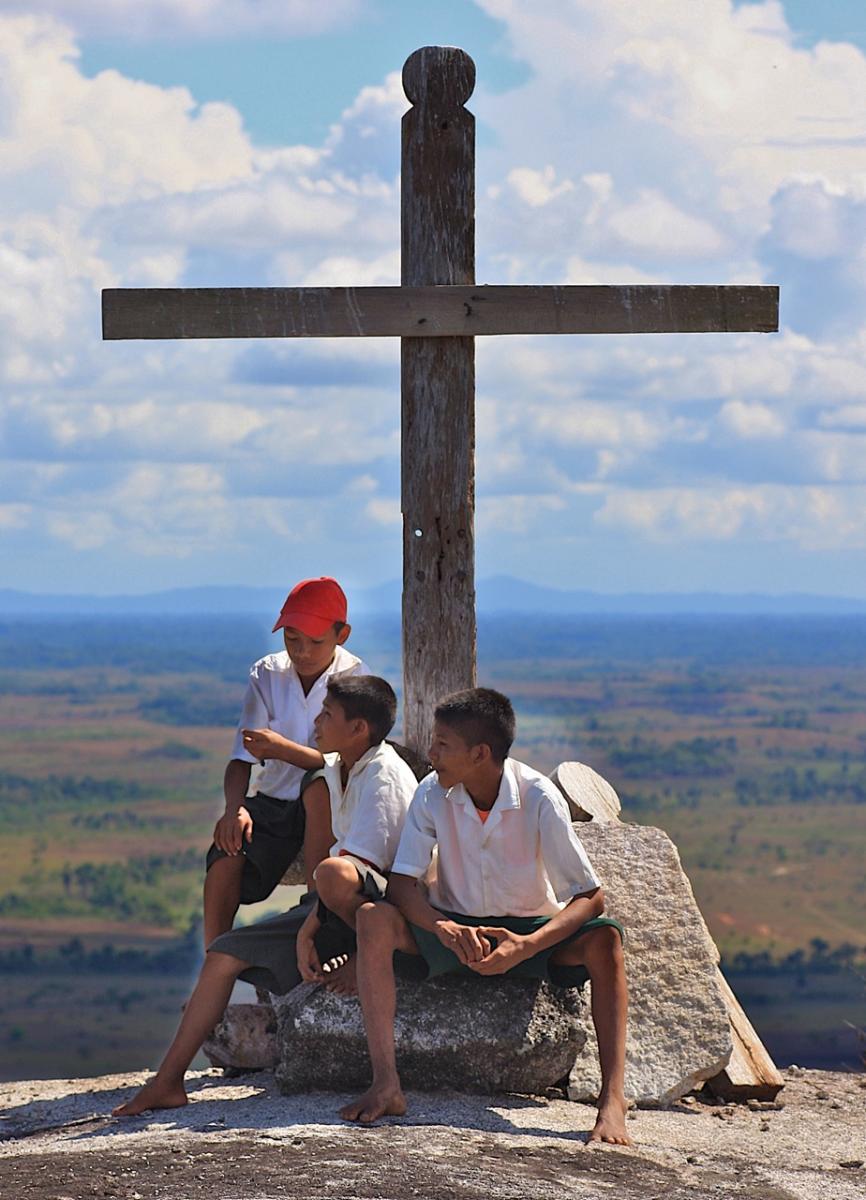 CHANS-Net member Jose Fragoso submitted this photo from his field work in the Brazilian Amazon. Affiliated with Stanford and the University of Hawaii, Fragoso is studying how shifting human world views interact with shifting environmental resources to affect biodiversity conservation.
CHANS-Net member Jose Fragoso submitted this photo from his field work in the Brazilian Amazon. Affiliated with Stanford and the University of Hawaii, Fragoso is studying how shifting human world views interact with shifting environmental resources to affect biodiversity conservation.
“The photo shows three indigenous Wapishana boys sitting below a Christian cross. The cross sits atop a solid stone, mammoth inselberg, a site identified as spiritually powerful within the indigenous Wapishana religion.
“The photo highlights the cultural and religious complexity found within our study system. In our area of the Brazilian Amazon, about 15 Christian religions now interact with the native Wapishana religion. Interactions between these and the Wapishana belief system may be altering linkages between native peoples and biodiversity."
Special issue of Ecological Modelling on CHANS research
At the American Association for the Advancement of Science Annual Meeting in Washington, D.C., in February 2011, six symposia were dedicated to exploring exciting and innovative ways to better understand the intricate connections between natural and human systems. Some 30 scientists weighed in with presentations, often to standing-room-only audiences.
Li An of San Diego State University, and David López-Carr of the University of California, Santa Barbara, are the editors of a special issue of Ecological Modelling focusing on modeling human decisions, based on the symposium “Mapping and disentangling human decisions in complex human-nature systems” they organized with Janet Silbernagel of the University of Wisconsin, Madison.
The issue features 10 papers addressing crucial aspects of human decision-making in complex coupled human and natural systems. These papers explore which human decisions have been modeled; which predictors may explain such decisions or pre-decision precursors; what goals can be achieved; what organizational units have been employed; what spatial scales have been considered; and what analytical or modeling approaches have been used.
Also in the works is another set of contributions to Ecological Modelling organized by Tim Kohler and Stefani Crabtree of Washington State University that will include papers based on presentations in their CHANS symposium from the AAAS 2011 meeting “Modeling across millennia: interdisciplinary paths to ancient socionatural systems.”
Upcoming events
2012 Behavior Change for a Sustainable World Conference
Aug. 3-5
Ohio State University, Columbus
2012 Human Dimensions Conference
Sept. 24-27
Breckenridge, Col.
EcoSummit 2012
Sept. 30-Oct. 5
Columbus, Ohio
AGU Fall Meeting
Dec. 3-7
San Francisco
Society for Risk Analysis Annual Meeting
Dec. 9-12
San Francisco






